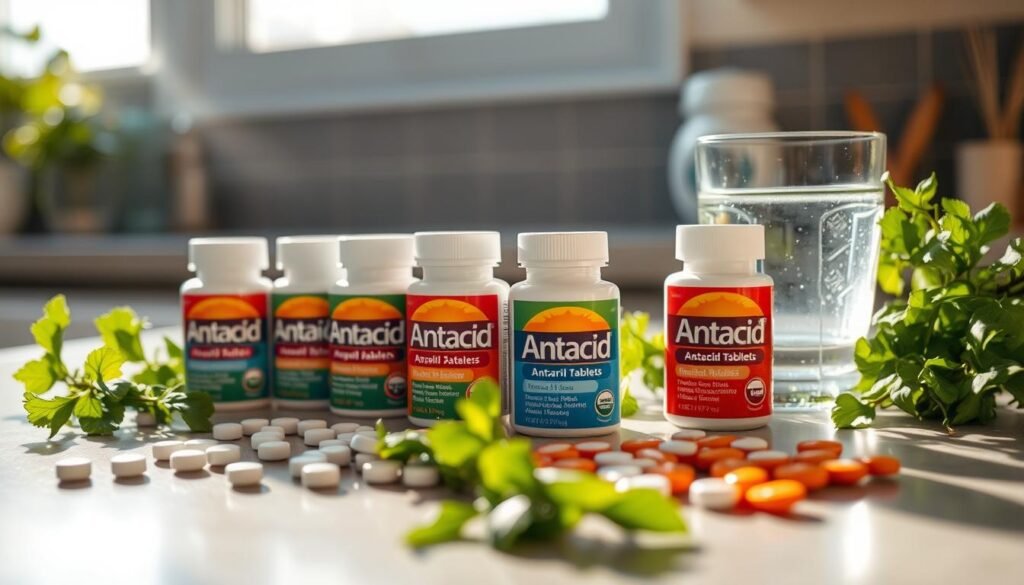Did you know GERD affects 10% to 20% of people in Western countries? This condition leads to heartburn and can make you feel tired and weak. Many suffer for years without speaking up. Knowing how to handle acid reflux symptoms and making lifestyle changes are key. This will help you get your life back. This article shares tips on using natural ways, diet tweaks, and lifestyle changes for better health.
Key Takeaways
- Acid reflux is common, but it might mean you have GERD if it happens a lot.
- Home remedies like ginger and chamomile can soothe your symptoms.
- Making changes in your diet and managing stress can boost your well-being.
- Knowing how GERD and fatigue are connected helps you deal with them better.
- If your symptoms keep up, talking to a doctor is a smart move.
Understanding Acid Reflux and Fatigue
Acid reflux often causes stomach acid to move back into the esophagus. This leads to discomfort and many symptoms. The trouble it causes can disrupt your sleep. This results in symptoms of fatigue that might impact your day. Knowing how acid reflux and fatigue are linked is vital. It helps greatly in managing acid reflux effectively.
In Korea, studies show that 20.7% of people getting health check-ups have reflux esophagitis. Also, 18.5% of them showed GERD symptoms. Those with GERD symptoms often feel more tired than those without. Lifestyle choices, like being overweight or smoking, play a role in acid reflux. Knowing this can help those suffering.
Managing acid reflux well can ease not just stomach-related symptoms. It can also reduce symptoms of fatigue. Fixing issues like hiatal hernias and changing what you eat helps a lot. Understanding the link between acid reflux and fatigue is key. It lets people find the right ways to feel better.
What is Gastroesophageal Reflux Disease (GERD)?
GERD is a long-term stomach disorder. It happens when stomach contents flow back into the esophagus. This is because the muscle at the esophagus’ end relaxes wrongly, letting stomach acid move up. Knowing the GERD symptoms early on helps in managing them.
Symptoms of GERD
Those with GERD may face various problems:
- Frequent heartburn
- Coughing or regurgitation of sour liquid
- Pain in the upper belly or chest
- Difficulty swallowing
- A sensation of a lump in the throat
Long-term contact with stomach acid can cause esophagus inflammation, or esophagitis. This makes swallowing painful. In serious cases, it could lead to Barrett’s esophagus or esophageal cancer.
Causes of GERD
Knowing the causes of GERD helps in dealing with it. Lifestyle plays a big role, including:
- Obesity
- Hiatal hernia
- Pregnancy
- Connective tissue disorders
- Delayed stomach emptying
- Smoking
Your diet affects GERD, too. Eating big meals or late snacks can trigger symptoms. Certain foods and drinks, like chocolate, coffee, and spicy or fatty meals, can worsen them. Pinpointing what triggers your GERD is key to feeling better.
Home Remedies for Treating Acid Reflux and Fatigue
Many people need good solutions for acid reflux and fatigue. Using home remedies for GERD in daily life is a promising strategy. It helps reduce symptoms without just using medications. Small steps like eating smaller meals, staying upright after eating, and avoiding trigger foods help a lot.
Popular Home Remedies
Lifestyle changes can really improve how you manage acid reflux. Some great home remedies are:
- Chewing gum after meals to increase saliva, which reduces stomach acid.
- Eating alkaline foods like bananas and melons to lower stomach acid.
- Drinking non-fat or almond milk for a calming effect.
- Adding ginger to your diet, through tea or as a spice.
- Mixing apple cider vinegar with water may help with heartburn.
Herbal Remedies That May Help
Many people use natural herbs for acid reflux relief. Some effective herbs include:
- Chamomile: Its soothing properties can reduce stomach inflammation.
- Licorice: It may protect the stomach lining but use it carefully.
- Marshmallow root: Creates a protective layer in the digestive system.
- Slippery elm: Coats the stomach lining to ease discomfort.
It’s important to talk with a healthcare provider before trying these natural solutions. This ensures they’re safe and won’t interfere with any medications. Getting professional advice is key to making sure a holistic plan for treating acid reflux works well.
Lifestyle Changes to Alleviate Acid Reflux
Changing your lifestyle is key to handling acid reflux. Simple steps can make a big difference in your life. By changing what you eat and how you live, you can ease the pain. This reduces the number of GERD episodes you might have.
Diet Modifications
What you eat greatly affects GERD symptoms. Eating more fruits, vegetables, and whole grains can help a lot. But, you should stay away from foods that make reflux worse, such as:
- Alcohol, particularly white wine and beer
- Caffeinated beverages
- Spicy and fatty foods
- Chocolate and acidic items like tomatoes
Eating smaller meals can take pressure off your stomach. This is important for managing your weight and GERD. A food journal helps identify foods that trigger your reflux, making it easier to adjust your diet.
Exercise and Weight Management
Staying active is vital for keeping a healthy weight, which lowers reflux risk. When you’re overweight, it can mess up the valve in your esophagus and worsen GERD. Try walking, swimming, or yoga to ease your symptoms. Avoid lying down right after eating to prevent reflux.
Raising your bed’s head by six to eight inches can also help with nighttime reflux. Wearing loose clothes offers comfort and reduces stomach pressure. Every small change helps in managing symptoms for a better and healthier life.
Diet Tips for Reducing Acid Reflux Symptoms
Managing acid reflux begins with the right diet. Use diet tips for acid reflux to lessen discomfort and improve your health. It’s important to pick the right foods and steer clear of those that cause problems.
Foods to Avoid
Some foods make acid reflux worse. Here’s what you should try to avoid:
- High-fat foods like fries and fatty meats
- Chocolate, due to its methylxanthine content
- Tomatoes and citrus fruits, which are acidic
- Coffee and sodas, since they have caffeine
- Garlic, onions, and other spicy foods
- Alcohol, as it can boost stomach acid
Beneficial Foods to Incorporate
Adding acid reflux-friendly foods to your diet helps control symptoms. Think about including these:
- Oatmeal, which absorbs stomach acid with its fiber
- Lean meats such as chicken, turkey, and fish
- Egg whites, a great source of low-fat protein
- Non-citrus fruits like bananas and apples
- Low-fat dairy, easier on the stomach
The Role of Antacids and Medications
Antacids are the first choice for fighting acid reflux symptoms. They are easy to find and help fast by balancing stomach acid. Brands like Gaviscon, Tums, Alka-Seltzer, and Mylanta are popular. They use ingredients like aluminum hydroxide, calcium carbonate, and magnesium hydroxide to ease heartburn and upset stomach.
Some antacids target specific problems. For example, bismuth subsalicylate can reduce nausea, and simethicone can decrease bloating. You can get antacids as liquids, chewable tablets, or tablets that dissolve. They work quickly, offering relief in minutes.
But, antacids aren’t meant for long-term use in managing GERD symptoms. If you have ongoing issues, you might need stronger meds that reduce acid, like H2 blockers and proton pump inhibitors. These types help for a longer time by stopping stomach acid production and fixing esophagus damage.
Antacids can cause side effects like constipation, diarrhea, and headaches if used too much. People with kidney problems or certain health conditions should be careful. They might need to avoid these over-the-counter options.
If antacids don’t help your discomfort, talk to a doctor. They can suggest other treatments or prescriptions that better manage GERD.

| Action | Type of Medication | Examples | Primary Use |
|---|---|---|---|
| Neutralize acid | Antacids | Gaviscon, Tums, Mylanta | Quick relief for heartburn and upset stomach |
| Block acid production | H2 Blockers | Cimetidine (Tagamet HB), Famotidine (Pepcid AC) | Long-lasting relief, effective for severe symptoms |
| Inhibit acid secretion | Proton Pump Inhibitors | Omeprazole (Prilosec OTC), Esomeprazole (Nexium) | Heal esophageal damage, long-term relief |
Proton Pump Inhibitors and H2 Blockers Explained
Proton pump inhibitors and H2 blockers help manage GERD symptoms. They work differently and offer benefits for those with acid reflux.
How These Medications Work
Proton pump inhibitors reduce stomach acid at its source. They are good for long-term GERD management. Drugs like omeprazole and lansoprazole cut acid by up to 65% when used daily. They provide relief for chronic conditions.
H2 blockers, like famotidine, also lower stomach acid quickly. They can relieve symptoms in an hour. The effects last up to ten hours. H2 blockers are best for occasional heartburn but less effective for ongoing issues.
When to Consult a Doctor
Seeing a doctor for GERD is important for proper treatment. If symptoms persist despite medication, speaking with a doctor is necessary. Long-term use of these drugs without improvement warrants a doctor’s assessment. It’s crucial to address GERD early to prevent serious complications, like esophageal damage.
Stress Management Techniques
Stress affects our stomach health, and this is true for those with acid reflux. Studies show that over 45% of people say stress causes their symptoms. Learning to manage stress can really help your stomach feel better.
Mindfulness and Relaxation Practices
Adding relaxation techniques to your day can calm stress. Yoga, deep breathing, and meditation help your body relax. This can lower your stress and improve your stomach’s health.
Activities like tai chi, writing in a journal, and listening to soft music help too. They let you connect with your body and ease stress. This boosts both your mind and your stomach’s health.
The Impact of Stress on Acid Reflux
Stress strongly influences acid reflux. It increases acid in your stomach, causing pain and heartburn. People with anxiety and depression often face worse GERD symptoms.
This shows how our minds and bodies are linked. Stress can also lead us to eat poorly, worsening reflux. Choosing healthy habits and reducing stress is key. To learn more, check out this article on stress and acid reflux.

Importance of Sleep Hygiene in Managing Fatigue
Getting enough sleep is key to fighting fatigue and staying healthy. For those dealing with GERD, good sleep habits are crucial. These habits not only help with nighttime issues but also improve how well you sleep. By learning and using better sleep methods, people with GERD can feel more energized and handle daytime tiredness better.
Tips for Improving Sleep Quality
To better your sleep with GERD, you can try several steps to make your sleep area better. Here are some important tips:
- Establishing a consistent sleep schedule to regulate the body’s internal clock.
- Creating a serene sleeping environment with minimal noise and light disruptions.
- Elevating the head while sleeping to reduce nighttime acid reflux episodes.
- Avoiding large meals, caffeine, and alcohol before bedtime to minimize GERD symptoms.
- Engaging in relaxation techniques such as deep breathing or meditation before sleep.
Adding these suggestions into your nightly routine can greatly improve your sleep. Better sleep will help you manage tiredness and boost your overall health.
| Practice | Effect on Sleep Quality |
|---|---|
| Consistent Sleep Schedule | Helps regulate sleep patterns, reduces daytime drowsiness. |
| Serene Environment | Minimizes disruptions, leading to deeper and more restful sleep. |
| Head Elevation | Reduces risk of nighttime acid reflux, enhances comfort during sleep. |
| Avoiding Certain Foods | Limits GERD flare-ups, promotes uninterrupted rest. |
| Relaxation Techniques | Enhances mental calmness, improves sleep onset and maintenance. |
Complementary Therapies for Relief
Many people with GERD explore other therapies along with usual treatments. These methods might offer more help for acid reflux symptoms. They give hope for better health without only taking medicines.
The Benefits of Acupuncture
Acupuncture is getting noticed for possibly easing GERD symptoms. Some studies show it might help heal and lessen acid reflux issues. It aims to balance the body’s energy, which could improve digestion and lower heartburn.
Exploring Hypnotherapy as a Solution
Hypnotherapy can help with acid reflux by promoting calm and lessening anxiety. This leads to fewer episodes of reflux. It looks at both the physical and mental sides of the condition. Talking to health experts can shed light on using hypnotherapy.

Those curious about these therapies should find an informed doctor to discuss their perks. GERD often does better with a whole-body approach. This involves changing lifestyle and adding treatments like acupuncture and hypnotherapy.
Discover more about complementary treatments.
When to Seek Professional Help
Knowing when to seek help for acid reflux is crucial for your health. It can stop complications and improve your life quality. Watch for signs that you need a gastroenterologist’s help.
Signs You Should Consult a Gastroenterologist
If you often have heartburn, trouble swallowing, or are losing weight without trying, it’s time to see a gastroenterologist. Serious symptoms like severe chest pain, vomiting blood, or breathing issues also need attention. A specialist can help find the cause and the best treatment for you.
Integrative Approaches with Healthcare Providers
Integrative care for GERD mixes traditional and alternative treatments. It’s great for tackling lifestyle and diet issues that cause acid reflux. By working with health providers, you can tailor a plan that includes medicine and changes in lifestyle. This team approach helps you understand and manage acid reflux better.
Conclusion
Dealing with acid reflux and tiredness requires a well-rounded plan. Over 60 million Americans get heartburn once a month. So, it’s important to look into all ways to handle it. This includes changing your lifestyle, what you eat, and seeking medical help.
Understanding what causes and how GERD feels is key. It helps you deal better with this widespread issue.
Adding ways to combat fatigue to your routine makes a big difference. Managing stress, working out, and eating right help together. They lessen symptoms. By making these changes, people can feel better and do more, despite GERD’s effects.
For those fighting acid reflux, trying a complete GERD care approach is rewarding. Being educated and active in managing symptoms and treatment is crucial. It ensures a better, happier life ahead.